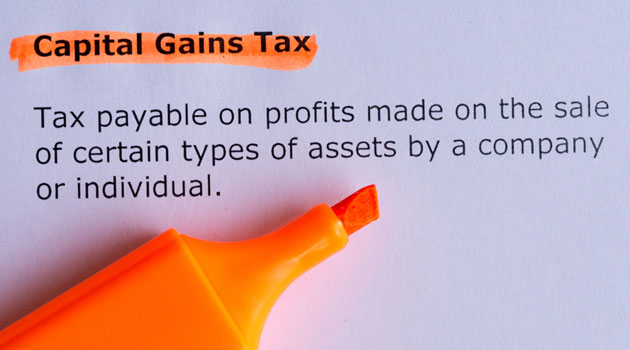Capital Gains Tax is due as a result of the financial gain (often referred to as profit) received once an asset is sold or disposed of in excess of the annual exempt amount (£12,300 20-21 tax year).
A disposal can be a sale, a gift or even the destruction of an asset. Where the sale is done on a commercial basis it’s the sales proceeds that are used for CGT. If a disposal is not on a commercial basis for example, a huge discount to a family member, the market value is used for CGT purposes.
The total gain is calculated by subtracting the sale value from the original purchase value. In addition, any sale costs can be deducted from the proceeds such as stock broker fees, estate agent fees etc. The gain is added to an individual’s taxable income to establish which band it falls into.

CGT arises when the contract for sale becomes binding regardless of when the money is received.
Jointly held assets are taxed in accordance of what percentages they are owned. Unless otherwise informed, HMRC assume a 50:50 split.
Transfers between spouses are treated on a no gain no loss basis. The receiving spouses acquisition cost is the same as the spouse that gifted and not the value on the date of transfer. Transfers inter spouse are only treated like this if they are living together at some point during the tax year.
There are 4 rates of CGT in the UK, 10%, 18%, 20% and 28%. The rate you pays depends how much of the gain falls into the basic rate band or above and the type of asset. If the gain crosses the bands part of the gain will be taxed at the lower rate and part the higher rate.
All gains falling into the basic rate band are taxed at 10% and all gains falling above the basic rate band are taxed at 20% except for gains on residential property which is 18% and 28% respectively, unless covered by principle private residence relief.
An annual exemption of £12,300 for the tax year 2020/21 is available to individuals and therefore total gains made in the tax year up to this amount are exempt. Any unused annual exemption is lost and cannot be carried forward or transferred to another person.
Previous years capital gains tax allowances can be seen in the right hand section.
The annual exemption should be used in the way that it minimises the most tax due e.g., on gains on a rental property before gains on shares.
Any capital losses made on a chargeable transaction are netted off against any capital gains made in the same tax year. They are applied before the annual exemption. Unused capital losses are carried forward against future capital gains; they cannot normally be carried back. To make use of a capital loss it must be reported to HMRC within 4 years of the end of the tax year in which it arose.

There are several different tax reliefs that can reduce the chargeable gain:
New rules from HMRC on capital gains tax came into effect from April 6th 2020, affecting mainly those buy-to-let landlords and second homeowners in the UK, who are selling properties that are not listed as their principal home residence, with the requirement for CGT to be reported and paid within 30 days of the sale taking place.
If you are selling a property that has been your main residency in the past, you will qualify for tax relief for the period of time you lived in the property over the whole ownership period.
It used to be the case that by simply leaving the UK for a complete tax year, and then disposing of any profitable assets (although different rules have always applied for property) during that year, you could be exempt from Capital Gains Tax. However, an individual now has to be non-resident for a minimum of five complete UK tax years to take advantage of this rule.
Even though you may be deemed non-resident for income tax purposes, you are treated as temporarily non-resident for capital gains tax purposes for up to 5 years. Certain gains made during that time are taxed in the year you return to the UK if within five years.
If the asset (being non-property related), such as a portfolio investment, was acquired after you had left the UK, any gain realised is not subject to UK Capital Gains Tax if you are indeed non-UK resident.
When double taxation agreements are taken into account, capital gains may be completely exempt from UK tax but taxable in the country where you reside.
Since the new rules came into force in April 2015 as a non-resident, when you sell a UK residential property including your main residence you must tell the HMRC, even if you have no capital gains tax to declare.
Failure to correctly make a capital gains tax declaration to the HMRC within 30 days after conveyancing (transferring ownership of) your property is likely to result in a penalty – even if there is no capital gains tax to pay.
Up until the 6th of April 2015 non-UK residents could sell UK properties and suffer no capital gains tax as long as they didn’t meet the temporary non-resident rule (5 complete tax years).
Since the new rule came into place, anyone owning a property in the UK, British or not, will be assessed for UK capital gains tax. The rule also applies to partnerships, companies and trusts.
While it is possible to be assessed for CGT on the original value of the residential property, you may elect to have the gain assessed on the 5 April 2015 market value of the property if owned before this date.

Want to find out more? Get in touch to talk to us about your current situation or to arrange
a meeting.